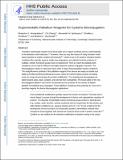| dc.contributor.author | Vinogradova, Ekaterina V. | |
| dc.contributor.author | Zhang, Chi | |
| dc.contributor.author | Spokoyny, Alexander M. | |
| dc.contributor.author | Pentelute, Bradley L. | |
| dc.contributor.author | Buchwald, Stephen Leffler | |
| dc.date.accessioned | 2017-07-05T14:14:19Z | |
| dc.date.available | 2017-07-05T14:14:19Z | |
| dc.date.issued | 2015-10 | |
| dc.date.submitted | 2015-02 | |
| dc.identifier.issn | 0028-0836 | |
| dc.identifier.issn | 1476-4687 | |
| dc.identifier.uri | http://hdl.handle.net/1721.1/110446 | |
| dc.description.abstract | Reactions based on transition metals have found wide use in organic synthesis, in particular for the functionalization of small molecules. However, there are very few reports of using transition-metal-based reactions to modify complex biomolecules, which is due to the need for stringent reaction conditions (for example, aqueous media, low temperature and mild pH) and the existence of multiple reactive functional groups found in biomolecules. Here we report that palladium(II) complexes can be used for efficient and highly selective cysteine conjugation (bioconjugation) reactions that are rapid and robust under a range of bio-compatible reaction conditions. The straightforward synthesis of the palladium reagents from diverse and easily accessible aryl halide and trifluoromethanesulfonate precursors makes the method highly practical, providing access to a large structural space for protein modification. The resulting aryl bioconjugates are stable towards acids, bases, oxidants and external thiol nucleophiles. The broad utility of the bioconjugation platform was further corroborated by the synthesis of new classes of stapled peptides and antibody–drug conjugates. These palladium complexes show potential as benchtop reagents for diverse bioconjugation applications. | en_US |
| dc.description.sponsorship | National Institutes of Health (U.S.) (GM-58160) | en_US |
| dc.description.sponsorship | National Institutes of Health (U.S.) (GM-101762) | en_US |
| dc.description.sponsorship | MIT Faculty Start-up Fund | en_US |
| dc.description.sponsorship | Damon Runyon Cancer Research Foundation | en_US |
| dc.description.sponsorship | Sontag Foundation (Distinguished Scientist Award) | en_US |
| dc.description.sponsorship | Massachusetts Institute of Technology. Dept. of Chemistry (George Buchi Research Fellowship) | en_US |
| dc.description.sponsorship | David H. Koch Institute for Integrative Cancer Research at MIT (Graduate Fellowship in Cancer Research) | en_US |
| dc.language.iso | en_US | |
| dc.publisher | Nature Publishing Group | en_US |
| dc.relation.isversionof | http://dx.doi.org/10.1038/nature15739 | en_US |
| dc.rights | Article is made available in accordance with the publisher's policy and may be subject to US copyright law. Please refer to the publisher's site for terms of use. | en_US |
| dc.source | PMC | en_US |
| dc.title | Organometallic palladium reagents for cysteine bioconjugation | en_US |
| dc.type | Article | en_US |
| dc.identifier.citation | Vinogradova, Ekaterina V. et al. “Organometallic Palladium Reagents for Cysteine Bioconjugation.” Nature 526.7575 (2015): 687–691. | en_US |
| dc.contributor.department | Massachusetts Institute of Technology. Department of Chemistry | en_US |
| dc.contributor.mitauthor | Vinogradova, Ekaterina V. | |
| dc.contributor.mitauthor | Zhang, Chi | |
| dc.contributor.mitauthor | Spokoyny, Alexander M. | |
| dc.contributor.mitauthor | Pentelute, Bradley L. | |
| dc.contributor.mitauthor | Buchwald, Stephen Leffler | |
| dc.relation.journal | Nature | en_US |
| dc.eprint.version | Author's final manuscript | en_US |
| dc.type.uri | http://purl.org/eprint/type/JournalArticle | en_US |
| eprint.status | http://purl.org/eprint/status/PeerReviewed | en_US |
| dspace.orderedauthors | Vinogradova, Ekaterina V.; Zhang, Chi; Spokoyny, Alexander M.; Pentelute, Bradley L.; Buchwald, Stephen L. | en_US |
| dspace.embargo.terms | N | en_US |
| dc.identifier.orcid | https://orcid.org/0000-0001-9519-7456 | |
| dc.identifier.orcid | https://orcid.org/0000-0003-3875-4775 | |
| mit.license | PUBLISHER_POLICY | en_US |
